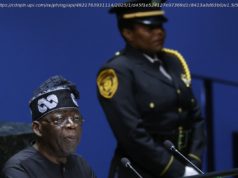Justices rule, in 5-to-4 vote, that teachers, police officers and other public employees can’t be forced to pay union dues
The US Supreme Court dealt labour unions a sharp defeat on Wednesday, ruling that teachers, police officers and other public employees cannot be forced to pay dues or fees to support their unions.
By a 5-to-4 vote, the justices overturned a 41-year-old precedent and ruled that the First Amendment protects these employees from being required to support a private group whose views may differ from theirs.
The decision, in Janus vs. AFSCME, strikes down laws in California, New York and 20 other mostly Democratic-leaning states that authorise unions to negotiate contracts that require all employees to pay a so-called agency or “fair share” fee to cover the cost of collective bargaining.
In 1977, when public sector unions were getting established, the high court said teachers and other public employees may not be forced to pay full union dues if some of the money went for political contributions. But the justices upheld the lesser fair share fees on the theory that all of the employees benefited from a union contract and its grievance procedures.
But today’s more conservative court disagreed and said employees have a right not to give any support to a union. These payments were described as a form of “compelled speech” which violates the First Amendment. Justice Samuel Alito wrote the majority opinion.
The anti-union National Right to Work Foundation, which funded the challenge, predicted the ruling would mean that more than 5 million public employees could choose not to support their unions.
More than a third of public employees are unionised, compared with only 6.5 per cent of workers in the private sector, according to the US Bureau of Labour Statistics.
The ruling does not immediately affect private-sector union contracts.
For the unions, which traditionally have supported Democrats, the ruling will mean an immediate loss of some funding and a gradual erosion in their membership. Union officials fear that an unknown number of employees will quit paying dues if doing so is entirely optional.
The ruling is likely to have a political impact in many states where these unions have been strong supporters of the Democratic Party.
US President Donald Trump hailed the ruling, saying on Twitter that it would mean a “big loss for the coffers of the Democrats!”
The ruling split the court along ideological and partisan lines. The five justices who formed the majority were all Republican appointees. The four dissenters were appointed by Democratic presidents.
The outcome comes as no surprise to the unions or their lawyers. Three years ago, the justices had before them an identical free-speech challenge to union fees brought by Rebecca Friedrichs, a California teacher. The five conservative justices appeared set to strike down the union fees, but Justice Antonin Scalia died suddenly in February 2016. A month later, the court announced it was divided 4-4 and could not issue a ruling.
Trump’s victory allowed him to replace Scalia with Neil M. Gorsuch who, as expected, cast the fifth vote for the conservatives.
The current case was started by Illinois Governor Bruce Rauner, a Republican, shortly after he took office. He sued to stop the forced collection of union fees, but a federal judge in Chicago said he had no standing to sue since he did not have to pay the fees. So Mark Janus, a state employee from Springfield, stepped forward as a plaintiff. He said he did want to pay $45 a month to support the American Federation of State, County and Municipal Employees.
As expected, he lost in the Seventh Circuit Court in Chicago because such union fees were legal under the court’s previous precedent, now overturned.






